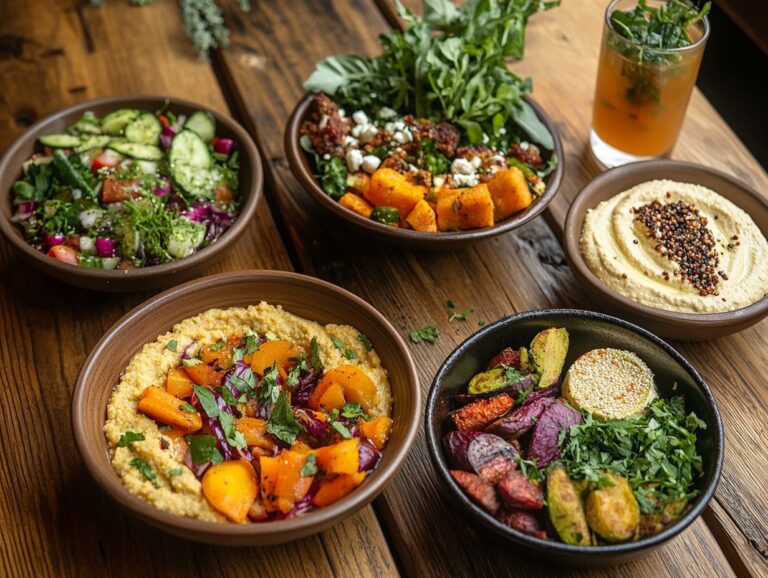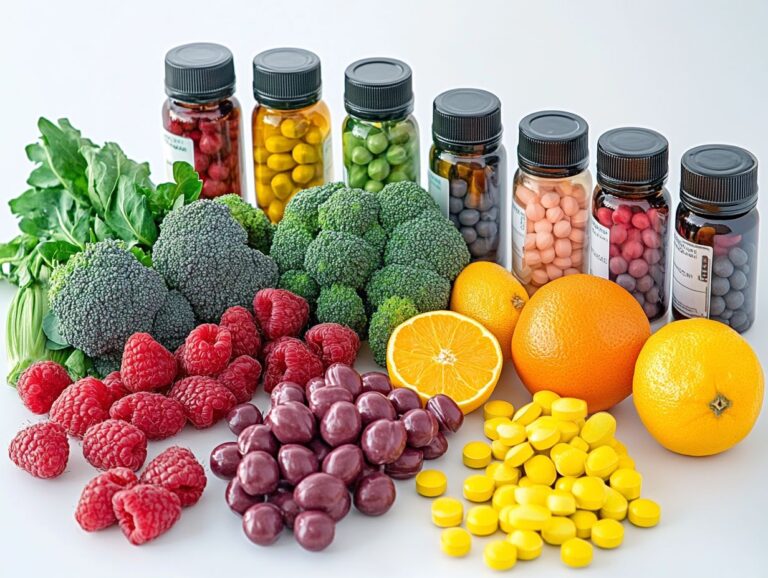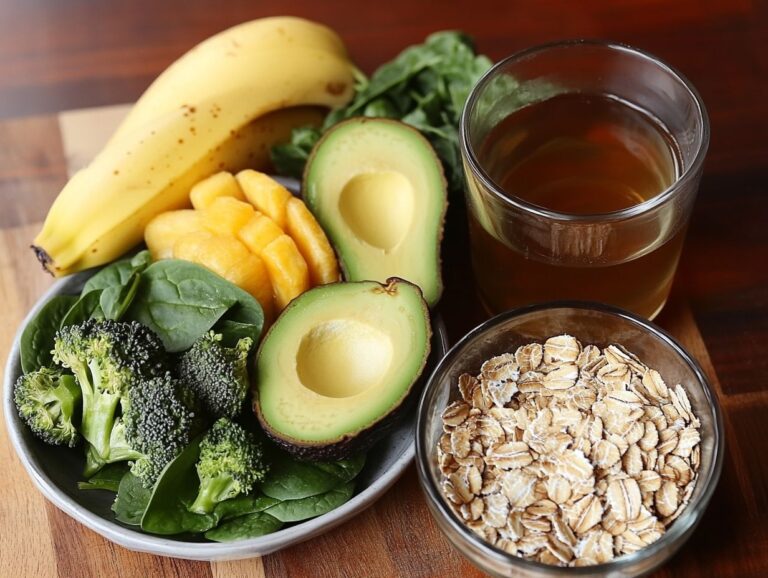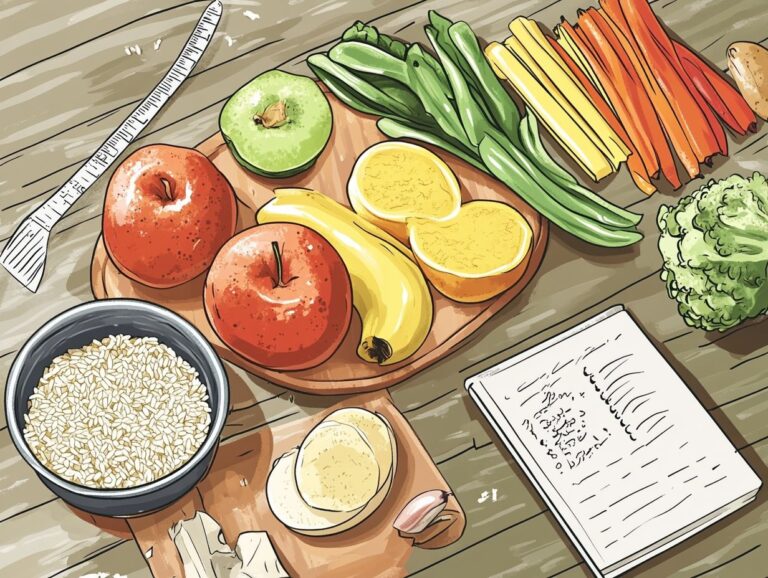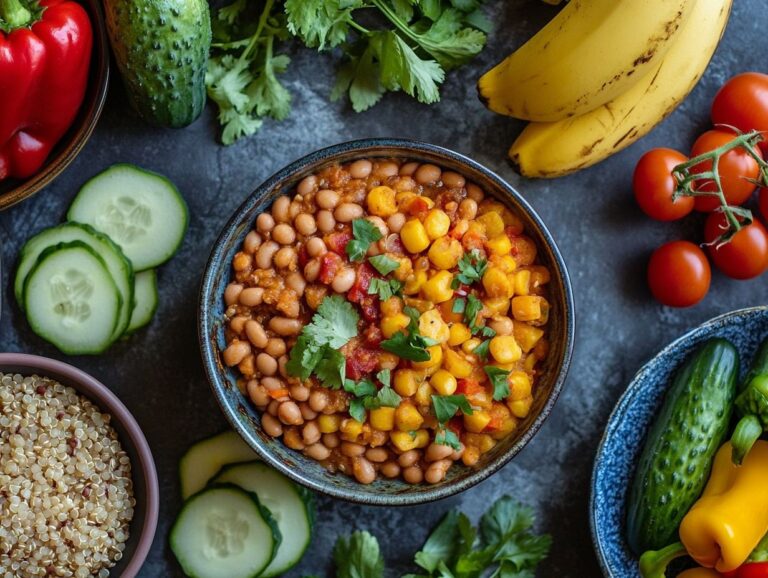This guide outlines the essential steps for creating a vegan marathon diet aimed at optimizing performance and recovery on race day. It covers the following topics: how to determine your calorie needs, how to select nutrient-dense foods, what to eat before, during, and after a marathon, and additional tips for maintaining a vegan lifestyle throughout your training.
Key Takeaways:
- Eat nutrient-dense, plant-based foods to fuel your body for long-distance running.
- Make sure to plan ahead and pack snacks for travel to maintain a vegan diet during marathon training.
- Incorporate a variety of protein sources and hydrate properly before, during, and after a marathon for optimal performance and recovery.
How to Plan a Vegan Marathon Diet?

A vegan marathon diet is a meal plan designed to meet the unique nutritional requirements of marathon runners, enabling them to enhance their athletic performance through healthy plant-based nutrition. This approach ensures that athletes meet their energy needs and nutrient deficiencies are minimized.
A well-planned vegan diet helps runners satisfy their energy needs for endurance training and provides the necessary nutrients to prevent potential nutrient deficiencies, including micronutrient needs like vitamin B12 and vitamin D, which are crucial for maintaining optimal health.
Notable vegan marathon runners, such as Scott Jurek, Fiona Oakes, Brendan Brazier, and Ruth Heidrich, have demonstrated that it is possible to successfully run marathons while adhering to a plant-based diet. However, it is essential to ensure that the diet is thoughtfully planned and tailored to address the specific nutritional needs associated with training and racing, such as carbohydrate intake and protein needs.
This guide will offer detailed information on how to effectively plan a vegan diet to meet those needs.
1. Determine Your Calorie Needs
Calculating calorie needs as a marathon runner following a vegan diet is essential, as each individual has different energy requirements based on the intensity and duration of their training.
Determining daily caloric requirements involves more than simply considering weight or age with a basic formula; it requires a comprehensive analysis of various factors, including training volume, body composition, and metabolic rate.
For instance, individuals with a higher training volume will need more calories to maintain their energy levels and support muscle recovery. This understanding enables marathon runners to tailor their nutrition to meet their specific needs, ensuring they are adequately fueled during both long runs and recovery days.
Consuming enough calories is crucial, as inadequate energy intake can negatively impact performance, increase fatigue, and hinder recovery, all of which can adversely affect marathon training.
2. Choose Nutrient-dense Foods
Nutrient-dense foods are crucial for marathon runners following a vegan diet, as they help meet nutritional requirements and prevent potential nutrient deficiencies.
Incorporating a variety of whole foods, such as legumes, whole grains, fruits, and vegetables, can significantly enhance overall health and athletic performance.
Legumes, including lentils and chickpeas, are excellent sources of protein and fiber, which aid in muscle recovery and promote feelings of fullness.
Whole grains, such as quinoa and brown rice, provide complex carbohydrates that are essential for sustained energy during long runs.
Fruits and vegetables offer a wide range of vitamins, minerals, and antioxidants that help reduce inflammation and support immune function.
By adopting these nutrient-dense choices, athletes can effectively fuel their training, ensuring they have adequate energy, proper recovery nutrition, and meet their calorie needs per day after intense workouts.
3. Incorporate Adequate Protein Sources
Vegan marathon nutrition that includes sufficient protein sources is essential for meeting protein requirements and supporting muscle recovery and growth after high-intensity training sessions.
There are several plant-based options available for those who follow a vegan lifestyle, providing protein while containing all the necessary amino acids.
- Tofu, a versatile soy product, offers complete protein and is an excellent ingredient to incorporate into stir-fries and smoothies.
- Legumes, such as lentils and chickpeas, are both high in protein and fiber, making them great additions to soups and salads.
- Quinoa, a unique grain, contains all essential amino acids and works well in grain bowls or as a side dish.
By incorporating these foods into their daily meals, endurance athletes can easily meet their protein needs and ensure that they receive essential vitamins and minerals, enhancing their athletic performance while enjoying the benefits of a diverse and nutrient-rich vegan diet.
4. Include Healthy Fats for Energy
Incorporating healthy fats into a vegan diet is crucial for marathon runners to meet their energy needs, as fats serve as a significant source of sustained energy during endurance training.
These essential dietary components, particularly omega-3 fatty acids found in flaxseeds and walnuts, play a key role in reducing inflammation, which can be especially beneficial for athletes engaged in strenuous activities. Including healthy fats like avocados and nuts enriches a vegan diet and supports overall endurance training.
Omega-3s support heart health and may enhance blood circulation, facilitating the delivery of oxygen to muscles. By including these healthy fats, athletes can not only improve their endurance performance but also promote overall well-being by enhancing cognitive function and stabilizing mood.
For athletes, maintaining optimal health is vital, and integrating nutrient-rich fats into their diet is an important strategy in their training regimen.
5. Don’t Forget About Carbohydrates
Carbohydrates are crucial in a vegan marathon diet because they supply the necessary fuel for endurance training and assist in replenishing energy stores after long runs.
These macronutrients play an important role in sustaining performance during workouts and races, as well as in recovery, by helping to restore muscle glycogen levels.
Marathon runners can benefit from consuming a variety of carbohydrate sources, including:
- Whole grains like quinoa and brown rice
- Fruits such as bananas and berries
Whole grains provide complex carbohydrates that ensure a steady release of energy, while fruits offer fast-digesting sugars that can enhance rapid recovery after exercise. These carbohydrates play a crucial role in achieving a balanced sports nutrition plan for marathon runners.
6. Hydrate Properly
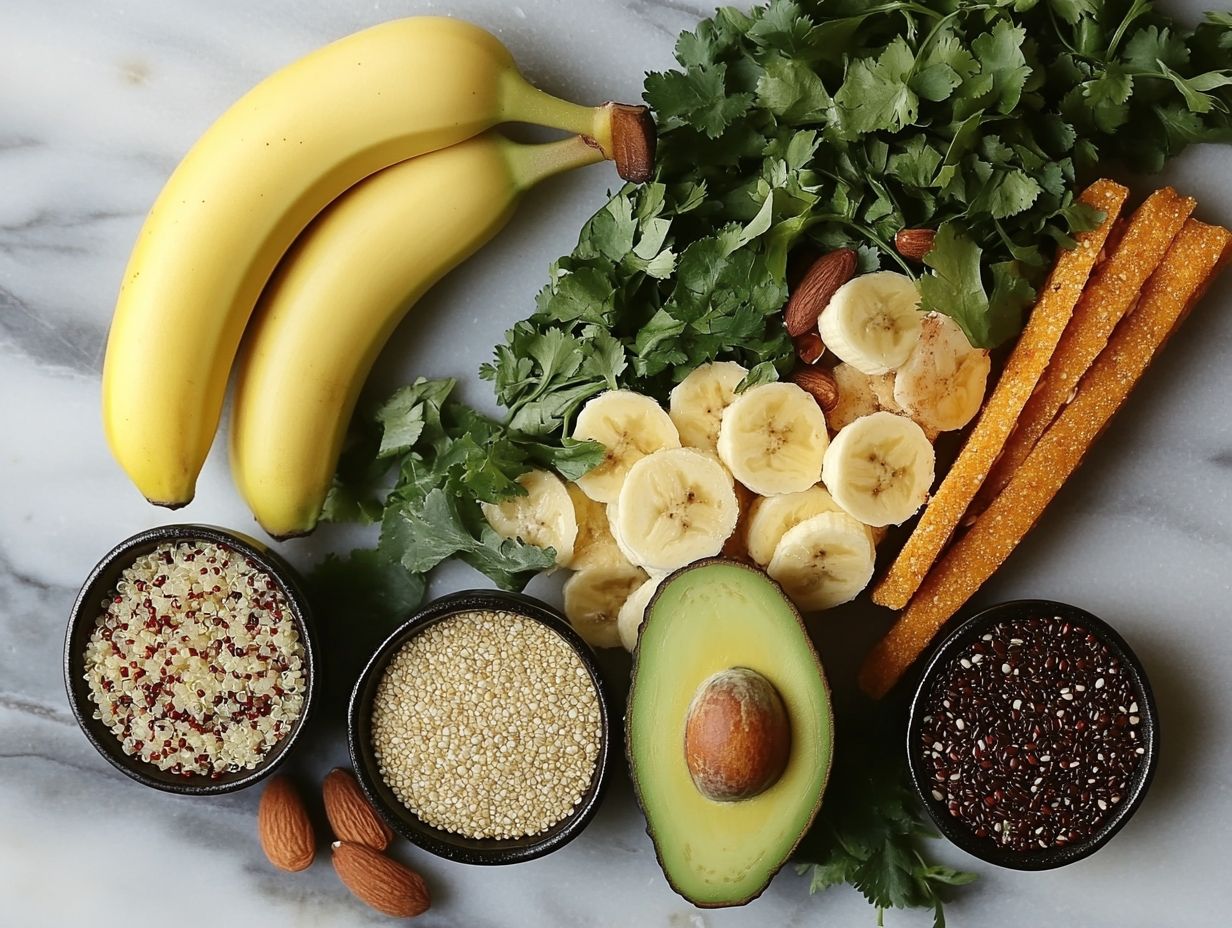
Hydration is crucial for marathon runners, as it is essential for performance and preventing dehydration during long runs and races. Proper hydration helps regulate body temperature, supports cardiovascular function, and improves overall stamina, which is particularly important for athletes striving to achieve their best.
To meet hydration needs, marathon runners should seek various sources of fluids, including:
- Water
- Herbal teas
- Coconut water
as well as water-rich foods like fruits and vegetables. Additionally, incorporating electrolytes from sports drinks or electrolyte tablets can help replenish essential minerals lost through sweat.
Optimal hydration strategies involve drinking water before, during, and after training sessions to prepare the body for long endurance runs. Monitoring thirst levels and urine color are also simple yet effective ways to ensure proper hydration throughout the training process.
What to Eat Before a Marathon?
Understanding what to eat before a marathon is crucial for optimal performance, particularly for vegan runners who need to select pre-race foods that meet their energy and carbohydrate requirements.
1. High Carbohydrate Meals for Pre-race Nutrition
Marathon runners are advised to consume high-carbohydrate meals before their races, as these meals provide the necessary energy to fuel the body during long-distance activities.
Vegan runners can include specific high-carbohydrate foods in their diets, such as:
- Quinoa bowls with black beans
- Sweet potatoes
- Oatmeal with bananas
These meals not only supply the required carbohydrates but also offer many essential nutrients. It is recommended to eat these meals two to three hours before the race to ensure that energy stores are full.
Additionally, energy bars made from dates and nuts are excellent snack options that are easily digestible and help maintain energy levels leading up to the race. Brands like Organic Muscle offer great plant-based options that align with a vegan diet.
2. Protein-rich Snacks
Consuming protein-rich snacks before a marathon can provide essential nutrients for muscle maintenance and improve recovery time, making them a vital component of a vegan athlete’s overall meal plan.
Foods high in protein, such as energy balls made with chickpeas, shelled edamame, or nut butter on whole grain toast, serve as excellent fuels to ensure optimal performance.
Timing is crucial; consuming these protein-rich foods approximately 30-60 minutes before running can optimize results by helping the body replenish and prepare for the demands of long-distance running.
Additionally, eating protein-rich meals or snacks after a race is essential for recovery nutrition. Hearty options like lentil salad or a quinoa and black bean mix are both excellent sources of protein that aid in repairing muscle damage and reducing soreness.
By incorporating protein-rich foods in this manner, vegan athletes can ensure they are well-fueled and well-recovered, contributing to a healthier lifestyle overall.
3. Hydrating Fruits and Vegetables
Incorporating hydrating fruits and vegetables into pre-marathon meals can help maintain proper hydration levels, which are essential for peak performance on race day. Ensuring adequate hydration also involves replenishing electrolytes and incorporating foods rich in antioxidants.
Fruits such as watermelon, cucumber, and oranges not only provide a refreshing taste but are also rich in water content, making them ideal choices for athletes preparing for intense exertion.
These hydrating options, including nutrient-rich vegan foods, can be easily blended into smoothies, added to salads, or enjoyed as snacks before heading to the race course, ensuring marathon runners stay prepared.
Leafy greens like spinach and kale are also excellent for supplying essential electrolytes, helping to replenish what may be lost through sweat.
By including these hydrating foods, runners can meet their nutritional needs while enhancing their endurance, ensuring they feel energized and prepared to tackle the race ahead.
What to Eat During a Marathon for Optimal Performance?
Vegan marathon runners have access to a wide range of energy gels, electrolyte drinks, and whole foods that can help sustain their energy levels and meet carbohydrate intake needs throughout the marathon.
1. Energy Gels and Chews
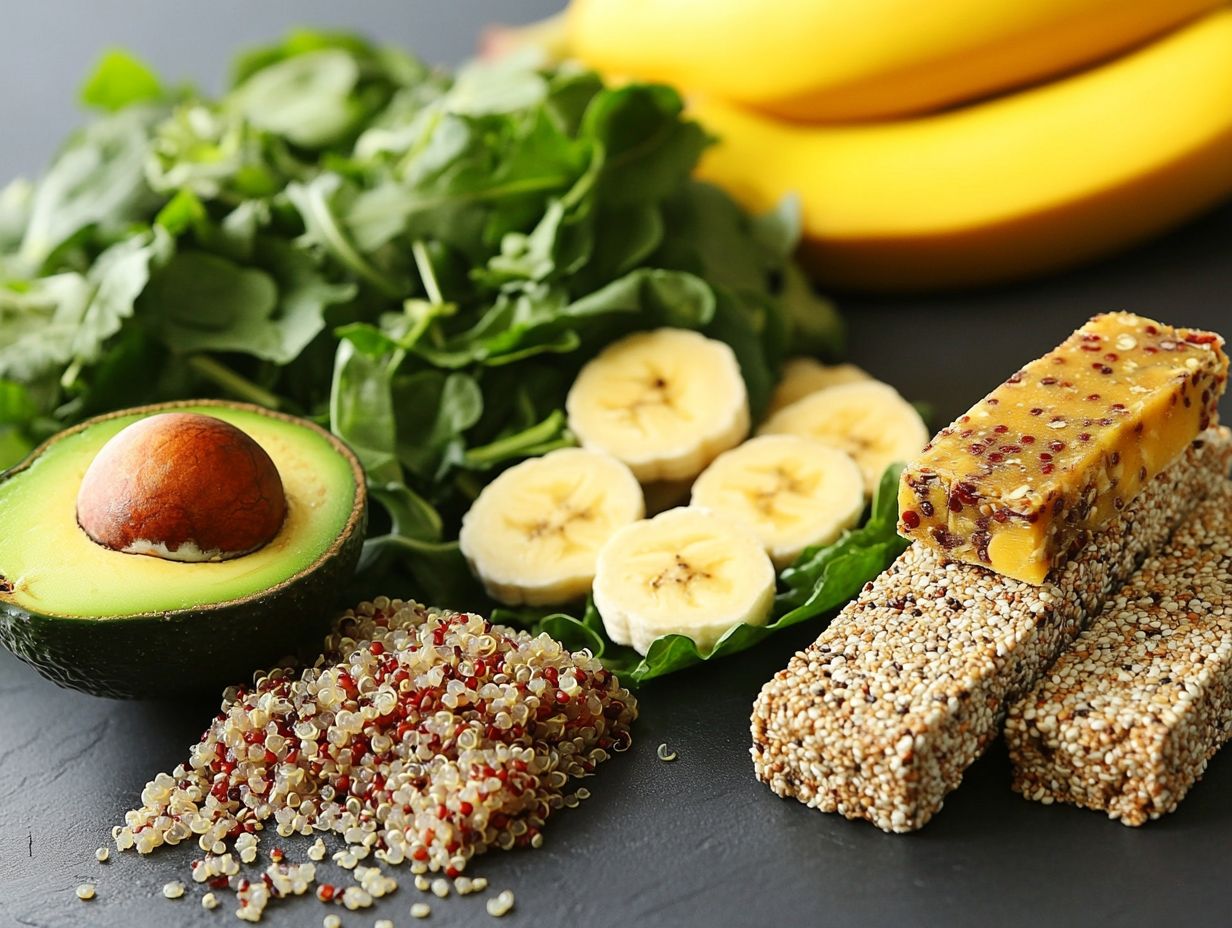
Energy gels and chews are products designed to provide quick energy in the form of sugars and carbohydrates for marathon runners. These products enable athletes to maintain their energy levels during races and high-intensity workouts.
They are especially effective in delivering an immediate energy boost when fatigue sets in, which is crucial during the peak of endurance events. Many runners find that consuming these products at various intervals helps sustain their hydration and performance levels, making them essential during races.
With the increasing popularity of veganism, many running enthusiasts are now seeking energy gels and chews that do not contain any animal-derived ingredients or flavors. Fortunately, there is a wide range of options available on the market today.
Vegan energy gels and chews are free from animal-derived ingredients such as gelatin and often feature natural flavors, ensuring that runners can easily find suitable products to restore their energy and stamina during marathons.
2. Electrolyte Drinks
Electrolyte drinks play a crucial role in hydration for marathon runners by helping to replenish the electrolytes lost through sweat and maintain optimal performance. These beverages are specifically designed to prevent dehydration, ensuring that stamina is not compromised during long-distance runs.
For vegan athletes, selecting the appropriate electrolyte drink involves checking the ingredients to ensure they align with their dietary preferences. Options such as coconut water, which is naturally rich in potassium, or commercially available vegan electrolyte powders, can serve as excellent alternatives.
It is important to consume these drinks strategically throughout the race, starting before the marathon and continuing at regular intervals, to help sustain energy levels and optimize recovery after the event.
3. Whole Foods for Sustained Energy
Whole foods are ideal for marathon runners, especially vegan athletes who prefer natural carbohydrate sources to support their endurance training, as they provide longer-lasting energy.
These foods not only deliver essential carbohydrates necessary for sustained activity but also offer vital nutrients that enhance overall athletic performance.
For instance, bananas are an excellent source of potassium and easily digestible sugars, which help maintain consistent energy levels. Sweet potatoes provide complex carbohydrates combined with fiber, leading to a gradual release of energy.
Consuming nut butter or energy bars made from whole grains can supply healthy fats and proteins that further replenish energy reserves.
Hydration is equally crucial; incorporating electrolyte-rich fruits such as oranges and watermelon into the diet can help restore lost fluids, maintain electrolyte balance, and keep the body functioning optimally.
What to Eat After a Marathon for Recovery Nutrition?
Post-marathon recovery nutrition for vegans is essential for recovery and should consist of protein-rich meals, antioxidant-rich foods, and adequate hydration to address micronutrient needs.
These components support muscle repair, replenish energy stores, and facilitate other recovery processes for marathon runners, addressing their protein needs and potential nutrient deficiencies.
1. Protein-rich Meals for Muscle Repair
Consuming protein-rich meals after a marathon is essential for muscle repair, as these meals supply the nutrients needed to recover from the physical strain of the race. A wide variety of vegan protein sources can contribute to this recovery.
For instance, lentils, chickpeas, and quinoa not only provide a significant amount of protein but also contain the essential amino acids required for muscle repair. A hearty vegan meal after a race could include a large serving of lentil stew or a chickpea salad topped with tahini dressing.
Additionally, a smoothie made with pea protein powder, spinach, almond milk, and other ingredients can serve as a quick and convenient post-race meal. Such meals are crucial for ensuring the body receives the necessary nutrition following strenuous endurance activities.
2. Foods High in Antioxidants for Recovery
Foods high in antioxidants play a vital role in post-marathon recovery by reducing inflammation and supporting recovery for vegan runners. The intensity of long-distance running places significant physical stress on the body, leading to oxidative stress.
To aid in recovery, vegan athletes should incorporate a variety of colorful fruits and vegetables into their diet, including:
- Blueberries
- Spinach
- Sweet potatoes
These foods are rich in antioxidants such as vitamin C and beta-carotene, which help neutralize free radicals produced during intense physical activity. Additionally, legumes and whole grains provide important nutrients along with antioxidant benefits.
By focusing on these nutritious options, runners can promote effective and speedy recovery, which is essential for improving their athletic performance in the future.
3. Adequate Hydration
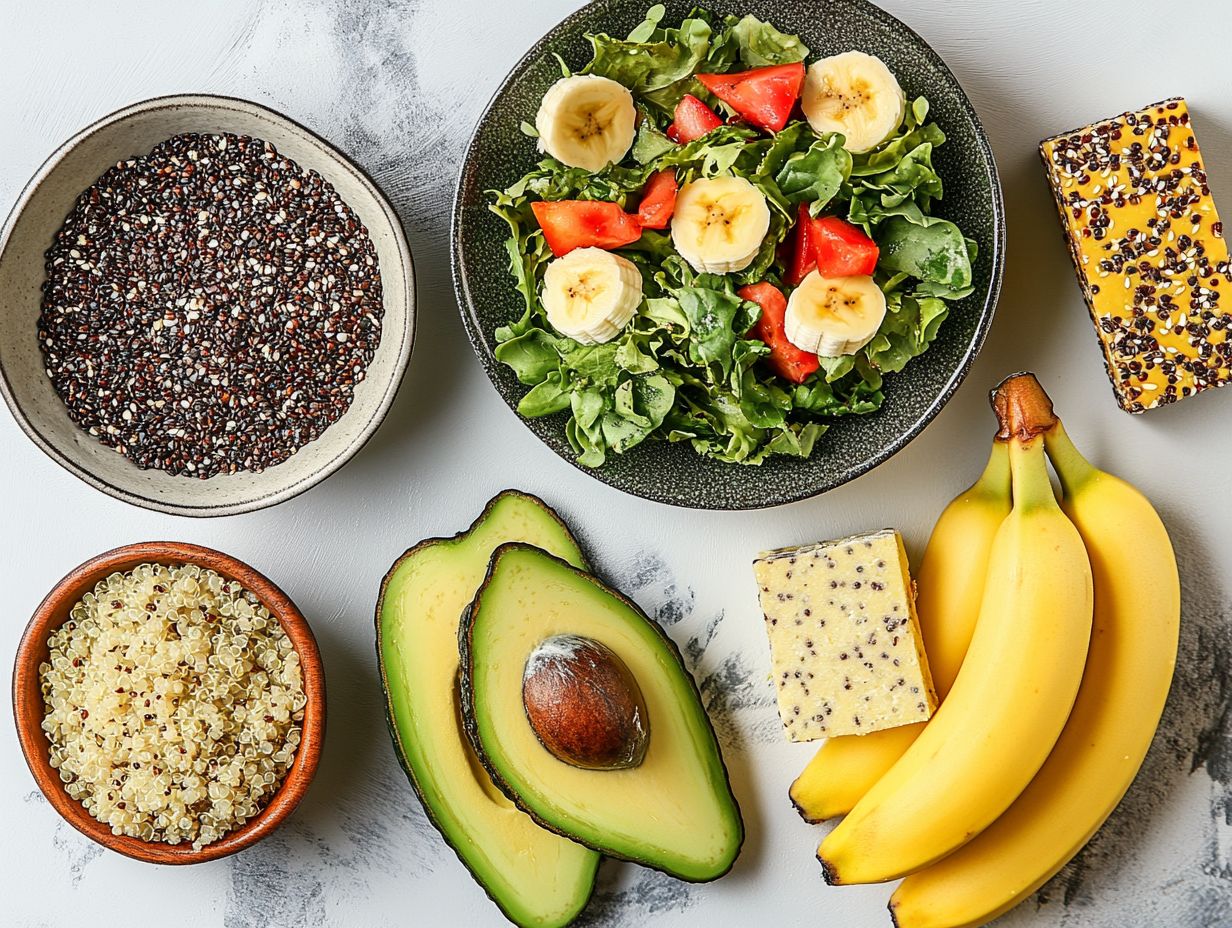
Hydration is crucial for recovery after a marathon because it helps replenish fluids and prevents complications associated with dehydration. Following a demanding race, the body’s need for fluids is at its peak due to the loss of water and electrolytes through sweat.
To promote recovery, it is important to consume a combination of fluids that not only provide hydration but also support muscle repair. Electrolyte-replenishing drinks, such as sports drinks, are effective in replacing sodium and potassium—electrolytes essential for nerve function and muscle contractions.
Additionally, beverages like coconut water and low-fat chocolate milk help restore lost nutrients during the recovery process. Selecting the right drinks can significantly impact how quickly one feels normal again.
Tips for Maintaining a Vegan Diet During Marathon Training
Adopting a vegan diet while training for a marathon requires careful planning and attention to nutritional needs, including vitamins and minerals, to ensure that energy requirements are met and athletic performance is optimized.
1. Plan Ahead
Planning ahead is essential for successfully maintaining a vegan diet while training for a marathon, as it enables runners to prepare nutritious meals that meet their energy and nutritional needs, including calories per day.
Investing time in meal planning by strategizing meal prep and creating detailed shopping lists ensures that athletes have access to a wide variety of plant-based foods rich in the vitamins, minerals, and energy-providing macronutrients they require.
Batch cooking can further streamline meal preparation, providing quick access to balanced meals during busy training weeks. To ensure optimal meal quality, it is important to include whole grains, legumes, and a diverse selection of fruits and vegetables.
Additionally, using apps or spreadsheets to track nutrient intake can help assess whether the dietary regimen aligns with training goals, including monitoring for potential nutrient deficiencies, making it easier to adjust as necessary.
2. Find Vegan-friendly Restaurants
Finding vegan-friendly restaurants is essential for marathon runners as it aids in their nutrition planning, allowing them to access nutritious meals even when away from home, ensuring plant-based nutrition is maintained.
With the assistance of apps and online resources, runners can easily locate restaurants that meet their dietary needs. Applications such as HappyCow and Yelp enable users to filter their searches for vegan options, simplifying the process of finding nearby vegan restaurants.
Reviewing a restaurant’s menu in advance can provide valuable information about the nutritional content of specific dishes. Marathon runners typically seek foods that are rich in complex carbohydrates, healthy fats, and proteins to support their long-distance training.
Additionally, customer reviews can offer insights into portion sizes and popular menu items, helping runners select appropriate meals to fulfill their nutritional requirements, including omega-3s and vitamins such as vitamin B12 and vitamin D.
3. Pack Snacks for Travel
Another important aspect of how travel can affect the energy needs of marathon runners on a vegan diet is the necessity of packing snacks. By bringing portable vegan snacks, these runners can ensure they receive the energy required while traveling.
Suitable vegan snacks include:
- Nut butters
- Energy bars
- Dried fruit
- Seed mixes
All of which offer a balance of carbohydrates, healthy fats, and protein. Fueling up during travel is essential for maintaining energy levels and preventing fatigue, especially for those who frequently engage in strenuous activities.
Therefore, marathon runners on a vegan diet should take a proactive approach by packing these snacks to ensure they have the necessary energy to complete their journeys, whether they involve long hikes, races, or other physically demanding endeavors.
4. Experiment with New Recipes
Experimenting with new recipes can greatly enhance the variety and enjoyment of a vegan diet during marathon training, making meal preparation both exciting and fulfilling, while meeting carbohydrate and protein needs.
By incorporating a diverse range of flavors, textures, and nutritional profiles, including plant-based nutrition, one can discover meals that not only satisfy the palate but also meet specific dietary requirements, particularly for marathon runners.
Trying out different vegan recipes is an effective way to address essential nutritional needs, ensuring an adequate intake of proteins, carbohydrates, and healthy fats that are crucial for endurance runners, enhancing athletic performance through targeted energy needs.
This approach offers an opportunity to creatively utilize seasonal fruits and vegetables, legume-based dishes, tofu, quinoa, chickpeas, and whole grains, resulting in a dynamic meal plan rich in whole foods and essential vitamins and minerals.
Such variety not only keeps mealtime interesting but also encourages adherence to a dietary regimen, as the excitement of exploring new flavors motivates consistency in healthy eating, supporting recovery nutrition and avoiding nutrient deficiencies.
5. Listen to Your Body’s Needs
Recognizing your body’s demands is crucial to ensure that a vegan diet supports your marathon training and overall health, as individual nutritional needs, including micronutrient needs like vitamin B12, vitamin D, calcium, and omega-3s, can vary significantly.
By developing self-awareness, you can more easily identify hunger signals and adjust your dietary intake accordingly. This is particularly important on a vegan diet, where macronutrients and micronutrients such as protein, iron, vitamin B12, and antioxidants may be less readily available. Ensuring adequate carbohydrate intake and hydration is vital for maintaining optimal athletic performance.
Heightened awareness of physiological signals enables athletes to fine-tune their meals and snacks, thereby maximizing energy levels, aiding recovery, and maintaining peak performance, especially during endurance training. Additionally, this increased awareness fosters a healthier relationship with food, crucial for balancing electrolyte levels during and after marathon events.

